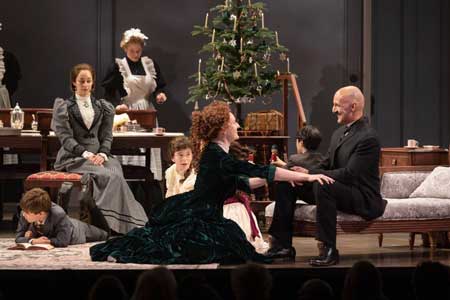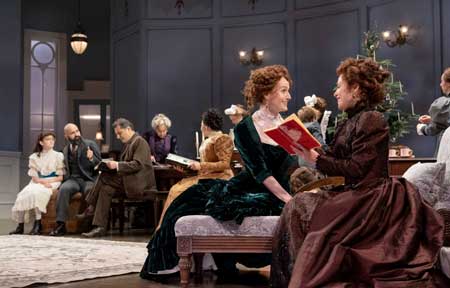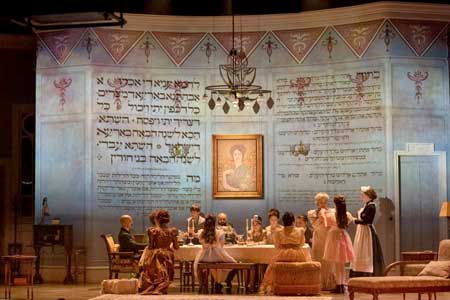Play (2020)
by Tom Stoppard
Directed by Carey Perloff
Huntington Theater Company
Shakespeare Theatre Company
The Huntington Theater
Symphony Hall area, Boston
September 12 – October 13, 2024
Ken MacDonald, Scenic Designer; Alex Jaeger, Costume Designer; Robert Wierzel, Lighting Designer; Jane Shaw; Sound Designer and Composer; Yuki Izumihara, Projection Designer; Tom Watson, Wig and Makeup Designer; Charles Haugland, Dramaturg; Drew Lichtenberg, Dramaturg; Dori A. Robinson, Associate Director; Daniel Pelzig, Movement; Jesse Hinson, Fight Director and Intimacy Consultant, Lee Nishri-Howitt, Dialect Coach; Emily F. McMullen, Production Stage Manager; Deirdre Benson, Stage Manager; Ashley Pitchford, Stage Manager; Janet Foster, CSA, Casting Director; Lyndsay Allyn Cox, Producing Director and Local Casting; Lexi Ashraf, Child Supervisor / Production Assistant
With Samuel Adams (Fritz / Percy), Firdous Bamji (Ludwig / Kurt), Joshua Chessin-Yudin (Zac / Nathan), Sarah Corey (Wilma), Elijah Ditkoff (Pauli / Young Leo), Samuel Douglas (Otto / Civilian and U/S Ernst), Maboud Ebrahimzadeh (Ernst), Tony Estrella (US Hermann / Ludwig / Kurt), Rachel Felstein (Eva / Nellie), Rebecca Gibel (Rosa / Hilde), Mae Grimley (Young Sally / Mimi), Phyllis Kay (Grandma Emilia / Eva), Holden King-Farbstein (Pauli / Young Leo), Adrianne Krstansky (Poldi / Hanna), Brenda Meaney (Gretl), Golda Munzer (Young Sally / Mimi), Quinn Murphy (Young Jacob / Heini), Nael Nacer (Hermann), Hannah Nocon (Young Rosa / Bella), Anna Slate (Jana / Sally), Simonne Stern (Young Rosa / Bella), Anna Theoni DiGiovanni (Hannah / Hermine), Elias Wettengel (Young Jacob / Heini), Mishka Yarovoy (Jacob / Leo)

Nael Nacer as Hermann
in “Leopoldstadt”
Photo: Liza Voll Photography
Courtesy of Huntington Theater Company
The family is large and varied, and many of them appear onstage in this excellent production of Tom Stoppard’s recent play, inspired by his own Jewish upbringing in Czechoslovakia. Several generations of this family appear, first, at the turn of the twentieth century when the lives of Jews in Vienna was relatively placid, despite persistent currents of embedded anti-Semitism. The social engagements and the business endeavors of the family are relatively normal and placid.
To the extent that this far-ranging family portrait has a focus in this early scene, it is upon Hermann (Nael Nacer), a Jew by birth who has converted to Christianity, and his lovely non-Jewish wife Gretl (Brenda Meaney). Gretl is taken into confidence by Hannah (Anna Theoni DiGiovanni), a cousin by marriage, who has taken a liking to a handsome military man named Fritz (Samuel Adams). As things develop, it appears that Gretl is dallying with Fritz, though she offers to him that she honestly loves Hermann and is not in it for the long run. Hermann and Fritz meet at a club they both attend and it seems – though seeming isn’t everything in this play – that Hermann is ready to challenge Fritz to a duel based on some sense of what has transpired. In addition to this intrigue, there is a lot of additional talk about mathematics – Hermann’s cousin Ludwig (Firdous Bamji) is a mathematician – and what are perceived as the incipient follies of Zionism. As well, there is some discussion about the emergence of psychoanalysis.
As the scene shifts forward to 1924, there is a sense of the tragedy of the first world war, demonstrated in starkness by the severe physical and emotional trauma exhibited by Jacob (Mishka Yarovoy), the son of Hermann and Gretl. The bris (Jewish ritual circumcision) of Nathan, the newborn son of Sally (Anna Slate), the daughter of Wilma (Sarah Corey) a Jewish family member and her Christian husband Ernst (Maboud Ebrahimzadeh), and Sally’s Jewish husband Zac (Joshua Chessin-Yudin), focuses the action offstage, with some relevant associated humor from Otto (Samuel Douglas), a banker associate of Hermann’s who drops by with some ambiguity about whether he is the mohel (performer of the ritual circumcision). When he asks for a cigar knife and then suggests that if there weren’t one he could simply bite it off, the mistaken parlay offers good fun in the midst of what is ultimately high drama. A painted portrait of Gretl reigns over the room as an emblem of the high social and economic stature of the family.
That drama ensues as the time shifts to 1938 and the lives of Jews have been seriously limited. The family sits in a barren house. Percy (Samuel Adams), an English journalist who is pursuing Bella (Hannah Nocon), urges the family to leave, to no avail. Grandma Emilia (Phyllis Kay), the matriarch, indicates that there have been hard times before and that the family will stay and wait things out. The scene ends with the sounds of shattering glass and the suggestion of the calamities of Kristallnacht, the so-called night of the broken glass, when Nazi hordes entered Jewish homes and wreaked destruction.
Finally, in 1955, we encounter Nathan (Joshua Chessin-Yudin), now in his thirties, meeting with his cousin Leo (Mishka Yarovoy) who has lived in Britain. Joining them is Rosa (Rebecca Gibel), Nathan aunt and Leo’s cousin. They reflect on the stolen portrait of Gretl which they hope to retrieve from the hands into which it fell after the Nazis stole it. And then they recount what has happened to the members of this large family. In a final tableau, that large family – thirty-eight characters in all – join together onstage.

Rachel Felstein as Eva
in “Leopoldstadt”
Photo: Liza Voll Photography
Courtesy of Huntington Theater Company
I saw this play a couple of years ago on Broadway, and despite the various accolades given to it including several Tony awards, I was not particularly impressed. I was touched by the fact that Stoppard, a great playwright who grew up not knowing about his own Jewish background, took hold of it directly and forcefully in this play. But the play struck me as unwieldy in many regards – too many characters overall and too many characters onstage at once, and too much going on. As well, the four different time settings seemed to diffuse the action and motive even further, bringing on a set of characters, giving a sense of who they were, then dispensing with them as the next time period unfolded. The action never felt focused; instead of projecting the power of an epic, it felt like a group grope that was well-intentioned but not an accomplished piece of theater.
My feelings about the work were very much changed when seeing this current production at the Huntington. The staging is so good, the direction so capable, and the acting so excellent, that the diffuseness of the play that I had experienced a couple of years ago with the Broadway production diminished significantly. i still felt that there was too much going on and too many characters, but I really got a clearer sense from this Huntington production, because of its nuanced and evolved way of shaping the narrative, why all of these characters needed to appear. That only gets disclosed at the end, and leave it to say that having a series of family portraits of a family that was decimated by the Holocaustcame through at the end in spades.
There are still some narrative elements that I regard as problematic and not necessary to the tale. There is a curiosity about Gretl’s fling with Fritz and what Hermann has to say about it that seems contrived. Though one understands the motivation for adding this narrative flourish, it really makes little sense and does not have much impact on the overall significance of the tale.
Despite this, and the peppering of a lot of dialogue about mathematics that one would need some interpretive reach to acknowledge as significant to this narrative, this production brings out the sense of a rich family life in the complex and somewhat assimilated Jewish culture of Vienna and how it is deeply affected during the first half of the twentieth century.
There is much to be said about the acting and the production values of this show. In the central roles of Hermann and Gretl, Nael Nacer and Brenda Meaney are excellent. Phyllis Kay offers a wry and comedic twist with a sharp sense of Jewish humor, to her matriarch role. Beyond those, it would take a long time – because of their sheer numbers – to sing the praises of so many of the cast who all around offered excellent performances. There is quite a lot of doubling of roles, reducing the numbers of actors by a degree, a wise adjustment to this production from the Broadway version. So, Rachel Felstein gets to offer a lively rendition of Hermann’s sister Eva in the first part and then becomes her own daughter Nellie in the second part, while Anna Slate, in the first part, serves in the background as Jana, a nursemaid, but then takes center stage energetically and humorously in part two as Sally, the mother of Nathan who is the newborn being circumcised. There are also quite a few child actors in the production and they do a great job as well.

Photo: Liza Voll Photography
Courtesy of Huntington Theater Company
Other production values are notable. The choreography by Daniel Pelzig is excellent. Notably, the dance scenes involving Hermann and Gretl are engaging and moving, but the choreography goes far beyond that and is well integrated and tastefully done. The set by Ken MacDonald is thoughtfully designed, with the central portrait of Gretl as an intense and thoughtful focus. Video and projections Yuki Izumihara, particularly those which suggest the explosion of the Nazis, or the casting of the Passover Haggadah in Hebrew during the family Seder, are extremely well used, and music by Jane Shaw is thoughtfully composed and selected. Lighting by Robert Wierzel is seamless and well done, and costumes by Alex Jaeger are interesting, appealing and tastefully done.
Overall: an excellent production that transforms this play, which can be in other circumstances unwieldy, into an effective and powerful drama. Definitely go see it.
– BADMan (aka Charles Munitz)
Hi! My name is Mae Grimley and I’m in the show! I just noticed that you say in 1938 Percy is pursuing Bella, but i think you meant to say Nellie! Thanks for writing an article about the show! Bye!